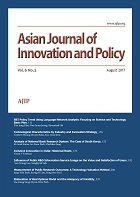 ISSN : 2287-1608
ISSN : 2287-1608
Mobility and productivity: brain circulation and sustainability of the Korean academic system
JeongMin Park
Somin Kim
Abstract
The purpose of this study is to examine the unique characteristics of the Korean academic system with regard to brain circulation, with a specific emphasis on the influence of overseas-trained academics on research activities within the Korean academic system. We have analyzed the statistical data on individual characteristics and performances of 48,499 Korean academics in science and engineering. We have examined the results at both the system and individual levels within the broader context of the macro characteristics of the Korean academic system. Our analysis reveals that the total number of domestically-trained academics exceeds the number of overseas-trained academics. However, in terms of research funding, overseas-trained academics tend to receive more funding than domestically-trained academics. Furthermore, after controlling other factors such as funding, personal attributes, and environmental factors, our analysis demonstrates that overseas training has a significant and favorable impact on the publication of internationally renowned journals. As such, the presence of overseas returnees has been essential for the effective functioning of the Korean academic system in the global research network and for conducting high-quality academic research. Therefore, the advantages of dependence on scientific core countries such as the US for overseas training have persisted. Nevertheless, upon scrutinizing the group of recently appointed 5,806 academics exclusively, we have discovered that junior academics who received their education domestically exhibit sufficient academic proficiency compared to their colleagues educated overseas. This observation highlights the potential for the Korean academic system to evolve into a self-sustaining system.
- keywords
- Researcher mobility, Brain circulation, Scientific productivity, Academic system, University research
- Downloaded
- Viewed
- 0KCI Citations
- 0WOS Citations

